Hungry for help: refugees in Kenya feel the effects of recent food cuts
KAKUMA REFUGEE CAMP, Kenya, January 9 (UNHCR) – Nyachot squints up at the midday sun above Kakuma Camp as she stirs the daily meal for her family. Before last November, the 34-year-old South Sudanese refugee could cook twice a day. But when the World Food Programme cut rations by 50 per cent that month, she feared for her children’s future.
“The food does not even last the two weeks that it should,” Nyachot told UNHCR visitors, turning to gaze at her baby son. Like thousands of other women at this camp in north-west Kenya, she relies completely on the rations she receives, in the absence of any other source of income. Full rations were later resumed on January 1, but the situation remains serious and fresh funding is needed to avert the risk of further cuts in the future.
Nyachot fled South Sudan in February last year, after fighting intensified between government forces and rebels. Desperate to save her children, she embarked upon an arduous weeklong journey that took her from her home in Maiwat, Upper Nile state to Nadapal, the border entry point to Kenya.
Her eyes filled with tears as she recalled the trauma. “I travelled by boat with about 40 other people for five long days to Juba and then took a bus from there to Nadapal,” she said. “My children were hungry and thirsty.”
When they finally arrived in Nadapal, UNHCR officials and other humanitarian agencies were there to greet them with energy biscuits and water. Later, at Kakuma’s reception centre, they received hot meals, sleeping bags and a place to sleep, before being transferred to Kakuma 4, the new settlement area for South Sudanese arrivals.
For Nyachot, finding refuge in Kakuma and receiving food assistance was a huge relief. Non-food items, such as blankets, cooking utensils, an energy stove and jerry cans, were also supplied and helped her family settle into their new home. But with the food ration cuts in November, Nyachot’s concern quickly began to grow.
In one of the nearby mud houses, Stephen and Gawar shared similar worries. They fled Pangak in South Sudan’s Jonglei state and, like Nyachot, sought refuge in Kakuma. “The situation is very bad,” observed Stephen, interviewed before full rations were resumed last week. “We eat once a day and the food can get finished after five days. Some of our people are even thinking of going back home. It is not an ideal solution, but people are desperate.”
Nyagai, their 36-year-old neighbour, concurred. “Once the rations run out, I survive by begging for food from my neighbours,” she says. “It is a shame to do so but what option do I have?”
Her friend, Nyapel, smiled sadly when she revealed that she could not breastfeed her 11-month-old son due to a medical condition. “I have to sell part of my meagre rations so as to buy milk for him. If I don’t this, then my son will not survive.”
After the ration cuts took effect in November, concerted efforts were made by World Food Programme to raise additional funding and restore full rations – and this was possible at the start of the month. But the funding situation remains uncertain and WFP and UNHCR have issued joint appeals to donors for help.
Meanwhile, UNHCR and partner NGOs continued to engage with refugees through their community leaders to assure them of continued support during November and December. These efforts were a result of the recent joint Inter-Agency Regional Appeal for the South Sudan Emergency Response.
Although refugees had been assured that this was a temporary situation, they remain concerned. “If the food cuts continue, many people will suffer, especially the elderly, the women and children,” said Gawar. Stephen believed that their hope lies with UNHCR.
As she turned back to her cooking, a glimmer of hope flickered in Nyachot’s eyes. She, at least, believed that things would get better; if not for her then at least for her children.
Page 3 of 18
-
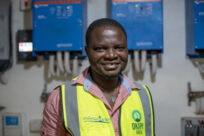
Refugee-led business provides clean energy to camp residents
9 Jun 2022Vasco Hamisi is hard at work checking on the solar panels at Okapi Green Energy Limited, in northwestern Kenya’s Kakuma refugee camp. The Congolese refugee is the brains behind this outfit, which provides clean energy to 200 businesses inside and outside the camp, as well as many refugee households. “I […]
-

Rwandan refugee begins new life caring for elderly Canadians
14 Apr 2022A pioneering programme is recruiting skilled refugees to fill labour gaps in Canada.
-
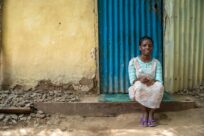
For refugee with visual impairment, inclusion brings goals into focus
3 Dec 2021Magartu studies alongside students without disabilities for the first time since she fled from Ethiopia – and she is now among the top in her class.
-
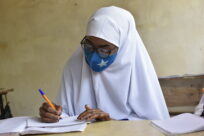
U.S. donates sanitary pads to support education of refugee girls in Dadaab
25 Aug 202120-year-old Mano Hamdan remembers very little about life in Kismayo, Somalia. Her father passed away in 2006 and the family struggled financially, as her mother tried to make ends meet. The death of her father, who was the family’s only breadwinner, coupled with insecurity in Somalia forced the family of […]
-
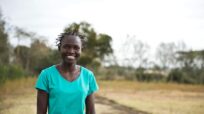
Three refugee athletes gain sports scholarships to Canada
24 Jul 2021Kenya-based middle-distance runners from South Sudan currently in Tokyo with the IOC Refugee Olympic Team in first intake of trailblazing athletic scholarship scheme.
-
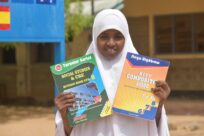
Edging closer to dreams of becoming a doctor – Fardowsa’s story
30 Jun 2021Seated in the middle of her class, 17-year-old Fardowsa Gedi tries to catch up with an on-going lesson of her favourite subject mathematics. In 2012, Fardowsa’s family fled drought in Somalia and now live in the Ifo camp, which is the oldest of the three refugee camps in the Dadaab […]
-
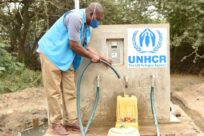
UNHCR introduces ATMs to supply water in Dadaab refugee markets
29 Mar 2021The establishment of the water kiosks is part of the Garissa Integrated Socio-Economic Development Plan (GISEDP), allowing refugees and host communities to share sustainable development programmes.
-
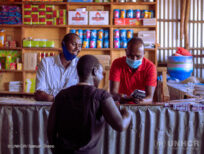
Understanding the Socioeconomic Conditions of Refugees in the Kakuma Refugee Camp
15 Mar 2021The Kakuma Socioeconomic Survey 2019 is jointly produced by UNHCR and the World Bank with support from the Kenya Bureau of Statistics. Focused on the residents of the Kakuma refugee camp and host community members in Turkana County, the survey aims to help fill socioeconomic data gaps and has […]
-
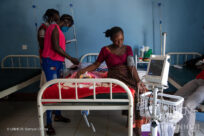
Expectant Refugee Mothers Find Solace in Continued Maternal Health Services During COVID-19
15 Feb 2021Eliana was four months pregnant when she heard about the first novel coronavirus case in Kakuma refugee camps in northwestern Kenya. “I was scared that, with most services closing down, the hospitals would close, too,” said the Burundian refugee. “Later, I saw that the hospitals remained opened and I was […]
-
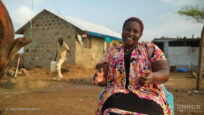
Home at last: For refugees in Kenya, moving from temporary shelter to newly built houses makes a world of difference
15 Feb 2021Kika stands outside her door and waves at her neighbours before opening the blue door that leads to her living room. At the far end is a solar-powered television set neatly surrounded by a group of plastic seats. Since her new house was completed nearly a year ago, Kika’s life […]
